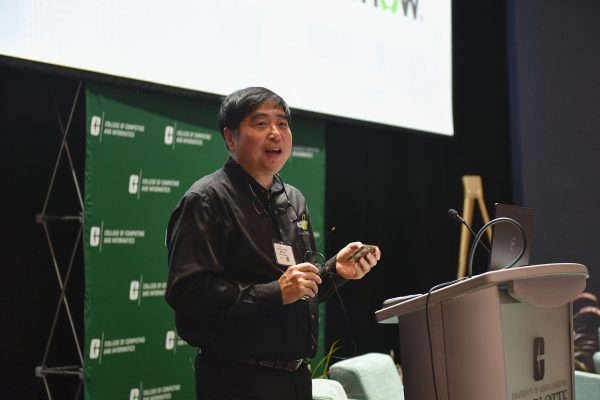Bill Chu and 25 Years Of UNC Charlotte Cybersecurity Excellence

It’s the year 2000. Dial-up internet reigns supreme. AOL has over 20 million customers. Cell phones don’t have cameras, let alone app stores. Most computers are bulky, desk-bound plastic rectangles. And if your company is forward-thinking enough to have a chief technology officer, chances are that person is still using a pager.
Twenty-five years ago was also when UNC Charlotte laid the foundation for its now nationally recognized cybersecurity program, made possible in large part thanks to the tireless efforts of Bei-Tseng “Bill” Chu, professor of software and information systems.
“All of us at UNC Charlotte are indebted to Bill Chu for his thoughtful stewardship of our cybersecurity program,” said Bojan Cukic, professor and dean of the College of Computing and Informatics (CCI). “Well before the internet had become an integral part of daily life, Bill had the vision to foresee a future where cyber defense would have major national security, financial and societal implications. His research, teaching and work to build strong connections with the business community have paid dividends in advancing the field and in creating opportunities for countless students.”
In addition to his research on secure computing and cyber threat hunting, Chu was the founding force behind UNC Charlotte’s Cybersecurity Symposium, which hosted its 25th edition earlier this week.
The very first symposium Chu organized in 2000 was a bit smaller in scope, to say the least.
“We had about 60 people attend. We had an invited talk, a panel, and we gave everybody a box lunch,” Chu said. He then touted that several members of that inaugural panel are still major partners with the cybersecurity program to this day.
It is now a perennially sold-out event where nearly 700 cybersecurity professionals, researchers and students from near and far gather on campus to teach and learn about the latest developments in the field and pave the way for innovative paths forward in cyber defense.
Did Chu and his collaborators think the symposium would grow to be such a major, influential event over two decades later?
“We had no idea!” Chu said with a grin.
Chu joined UNC Charlotte in fall 1988 after earning a Ph.D. in computer science from the University of Maryland, College Park. He was attracted to the University by how much he enjoyed Charlotte and by how he felt the city and institution were both exciting places of growth and potential.
About a decade later, when the College of Computing and Informatics was created by splitting off the existing computer science department from the William States Lee College of Engineering, Chu was tapped by CCI’s first dean, Mirsad Hadzikadic, to create a new department within the new college to cover computing-related fields that hadn’t historically been part of engineering’s purview. As the founding chair of the Department of Software and Information Systems, Chu was instrumental in the University’s burgeoning cybersecurity efforts, a key part of which was developing strong relationships between the college and tech-focused partners in industry.
“All of this started with Bill’s early leadership and forward-thinking efforts,” said Weichao Wang, current SIS department chair and a longtime colleague. “He put a lot of effort in visiting the companies. There were invited talks and security tutorials he offered over the weekend, all very selfless contributions to the department and to the community.”
Another way Chu helped UNC Charlotte’s cybersecurity program start strong was by leading the effort to have the University designated by the National Security Administration as one of the very first National Centers of Academic Excellence in Cyber Defense Education and Research in the country. UNC Charlotte was one of the earliest universities in the nation and the first in North Carolina to earn this status, and has been successfully re-designated as an NSA Center for Excellence ever since, with major implications in terms of recognition for the University and in securing funding opportunities for students over the years.
“Without tremendous support from our administration, from the business community and from our very talented faculty and staff, all of this wouldn’t be possible,” Chu said.
Citing recent CCI-led developments in areas including artificial intelligence-assisted international cyber threat-hunting and large language model innovations that could drastically reduce the number of cybersecurity AI “hallucination” errors, Chu is confident that UNC Charlotte’s leadership in cyber defense will only become more impactful the world over in the next 25 years.
“As long as you have people using technology, there will always be people who want to abuse it — that’s where we come in,” Chu said.
“Until the moment we reach utopia and nobody’s abusing the system,” he said. “Then we’ll be out of business, gladly.”